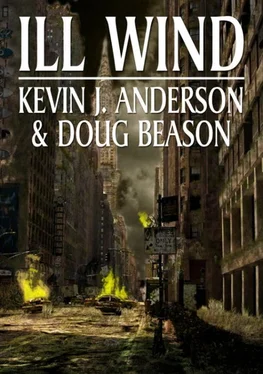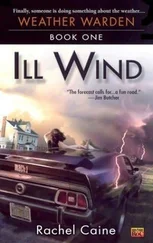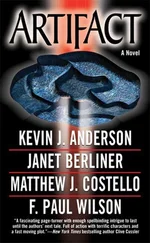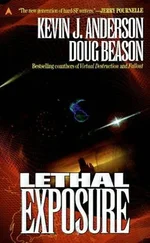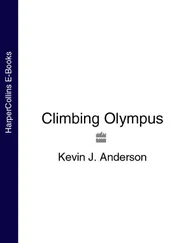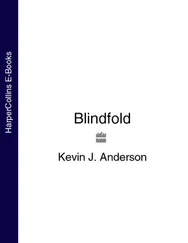When he reached the aqueduct between the hills, Todd directed the horse to follow the concrete embankment. Two men and a teenager dangled their feet in the languid canal, fishing with bamboo poles and cotton fish line. As Todd pulled the horse to a stop, Stimpy stuck her nose in the water, blowing out her nostrils and drinking deeply. “Any fish in there?” Todd asked.
A man in a battered straw hat shrugged. “Carp.”
“Are they good eating?” Todd noticed a chain-link basket slung low in the water.
“Depends how hungry you are,” the teenager said.
When the fishermen didn’t offer to continue the conversation, Todd rode off along the Altamont Pass Road and back over the crest of the hills. He dreamed of eventually making his way across country, riding back to his parents’ ranch, maybe even with Iris. But not for a while yet, not until things were a bit more settled.
Jackson and Daphne Harris, Doog, and the rest of the wacked-out commune had welcomed him and Iris in, giving them an old trailer to stay in. Todd was still embarrassed to be living with Iris without being married, but neither Iris nor the hippies seemed to care; it just didn’t fit in with the other women Todd himself had known, who either jumped from bed to bed or were dying to get married. But he stuck to his guns, insisting he would move out as soon as another place became available. He’d promised to take her away from Stanford, which he’d done, but he had not demanded to sleep with her as some kind of reward.
Iris accepted his companionship at face value, and from the other bed in the trailer she talked to him far into the night when he just wanted to go to sleep. During the day, when he didn’t think she was looking, he admired her petite figure, her dark almond eyes, and her jet-black hair. Iris seemed to have the energy of two people coiled inside her wiry body. He’d learned not to underestimate her. He felt his attachment running deeper, so deep that it frightened him.
But he didn’t want to just stay here and settle down. Todd found himself growing restless, wanting to do something more than mundane chores. He still felt responsible for the whole mess they were in—if he hadn’t been so eager to spray Alex’s darned bugs. the petroplague would never have happened. To soothe his own restlessness, he took long rides on the horses, ranging far from the commune when the goofballs at the commune drove him crazy.
He had appointed himself liaison between the Altamont colony and the remnants of the Livermore Lab on the other side of the range, where the once-large government research laboratories still had a few programs cobbled-together and scraps of barely functional equipment. Following the road, Todd reached the crest of the hills and headed west toward the city of Livermore to see if the labs had come up with anything new.
* * *
Thanks to her small and agile body, Iris Shikozu got the assignment of climbing the windmill masts to replace rotors as they burned out. With her toolbox stuffed in a canvas backpack between her shoulders, Iris clambered up the metal rungs to reach the top where the three-bladed aluminum wind turbine hung frozen, rattling in the breezes.
The windmill rows looked like a giant field of metal cornstalks on the hills. The wind gusted, making the mast rattle. Iris had to hook her arm through the rung to steady herself.
“Hang tight up there,” Jackson Harris called from below. Iris glanced down to see him cup his hands around his mouth. He said something else, but the wind snatched away his words.
It didn’t matter; she knew what she was doing. Reaching the top, she secured herself and unslung the backpack to find a screwdriver so she could unfasten the metal housing covering the wind turbine’s rotors. She had done this a dozen times before.
On the hills below, Doog and a couple of the refugee city kids amused themselves by tossing rocks into a gully. Doog always seemed to find simple things to keep himself preoccupied. Work usually wasn’t one of them.
Iris succeeded in removing the bolts from the housing and lifted up the protective metal. The lightweight aluminum blades were shaped to catch the wind from any direction; a vane at the rear helped to align them in the proper direction. The blades spun, turning a rotor that generated electricity. But without petroleum lubricants, the rotors burned out; and Iris had to keep replacing them. Back at the commune, Daphne Harris and some of the Oakland kids spent hours tediously rewrapping copper wire along the rotors.
As Iris removed the repaired rotor from her backpack to exchange the burnt-out one, she paused a moment. She was engrossed in her work, finding happiness in the aftermath of the petroplague, content in a way she had never experienced before. She felt at home.
It was very different from the life her parents had pushed her to pursue—to be the front runner in the rat race, to work sixty hours a week, to focus her goals on being the best , on getting ahead. Iris was normally high-strung, always on the move—but she was learning that it was okay to be different. She liked these simple comforts.
And she liked being with Todd.
She caught Todd looking at her many times when he thought she wouldn’t notice. Even when they were together he still seemed to long for her like some unreachable object. He was so clean-cut and straightforward; it calmed her to believe he had no private agenda, that he wasn’t after her for any reason other than herself. In his puppy-dog way, Todd couldn’t hide anything; subtlety was not his strong point, but she found it kind of sweet.
“Hey, you gonna daydream up there all afternoon?” Jackson Harris shouted up at her.
Iris quickly stripped out the old rotor and placed it in her backpack, then installed the new one. Clambering down the metal rungs, she overheard Harris and Doog talking.
“I sure wish we had some music during all this. That’s what I miss the most. Who’d have thought the Grateful Dead would finally die?” Harris kicked a stone into the gully.
As she stepped down the last rungs from the windmill mast, Iris remembered all the CDs she’d loved to play. The hardest things to live without were coffee and rock ‘n roll. She dropped to the gravel pad around the mast and turned to Harris and Doog.
“I miss the music too,” she said. “So what are we going to do about it?”
* * *
Todd Severyn rode his horse through the gates of the Livermore branch of Sandia National Laboratory. Spirals of razor wire crowned the tall fences, but the guard station sat empty. Nobody bothered to impose security anymore. Most of the lab facilities were broken down and unoccupied, but some of the researchers still came in to work, while others camped out in RV trailers in the parking lots.
For a month or so the teams had banded together, frantically trying to find some way to eradicate the petroplague; but as equipment broke down, computers malfunctioned, and the entire complex collapsed, most of them had given up hope. A few still continued plugging away to come up with innovative solutions.
Todd tied Stimpy up front to the bicycle rack and went inside the admin building. The lobby area for welcoming visitors had been turned into a command center. The bright and cheery PR posters for America’s national labs had been replaced by a large map of the United States studded with colored push-pins.
One of the administrators, Moira Tibbett, stared at the map with a sheet of paper in hand. She wore a dressy cotton outfit. Tibbett glanced at a list of locations on the paper, fingering a push-pin. She squinted at the map like an entomologist about to spear a specimen, then jabbed in the push-pin.
“More stuff for the Atlantis Network?” Todd asked. He poured himself a glass of warm sun tea; it tasted good.
Читать дальше
